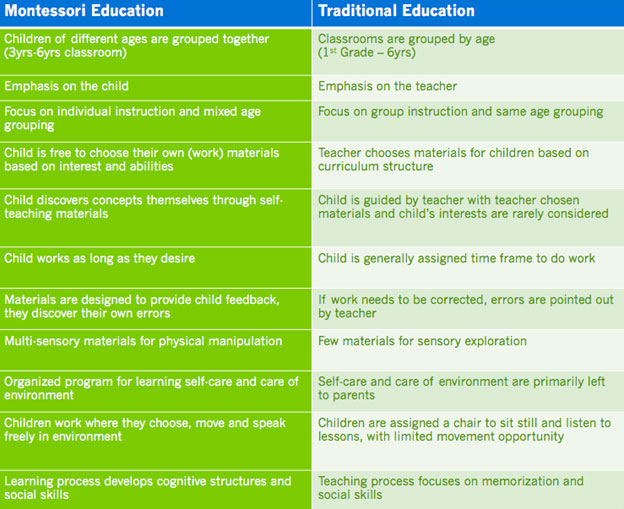- Where did Montessori come from?
Montessori (pronounced MON-tuh-SORE-ee) education was founded in 1907 by Dr. Maria Montessori, the first woman in Italy to become a physician. She based her educational methods on scientific observation of children’s learning processes. Guided by her discovery that children teach themselves, Dr. Montessori designed a “prepared environment” in which children could freely choose from a number of developmentally appropriate activities. Now, nearly a century after Maria Montessori’s first casa dei bambini (“children’s house”) in Rome, Montessori education is found all over the world, spanning ages from birth to adolescence.
- What is the difference between Montessori and traditional education?
Montessori emphasizes learning through all five senses, not just through listening, watching, or reading. Children in Montessori classes learn at their own, individual pace and according to their own choice of activities from hundreds of possibilities. Learning is an exciting process of discovery, leading to concentration, motivation, self-discipline, and a love of learning. Montessori classes place children in three-year age groups (3-6, 6-9, 9-12, and so on), forming communities in which the older children spontaneously share their knowledge with the younger ones. Montessori represents an entirely different approach to education.
- Is Montessori good for children with learning disabilities? What about gifted children?
Montessori is designed to help all children reach their fullest potential at their own unique pace. A classroom whose children have varying abilities is a community in which everyone learns from one another and everyone contributes. Moreover, multiage grouping allows each child to find his or her own pace without feeling “ahead” or “behind” in relation to peers.
- Are Montessori children successful later in life?
Research studies show that Montessori children are well prepared for later life academically, socially, and emotionally. In addition to scoring well on standardized tests, Montessori children are ranked above average on such criteria as following directions, turning in work on time, listening attentively, using basic skills, showing responsibility, asking provocative questions, showing enthusiasm for learning, and adapting to new situations.
- What special training do Montessori teachers have?
Most training centers require a bachelor’s degree for admission. Training ranges from 200 to 600 pre-service contact hours and covers principles of child development and Montessori philosophy as well as specific uses of the Montessori classroom materials. Montessori training centers can be found across North America and around the world.

